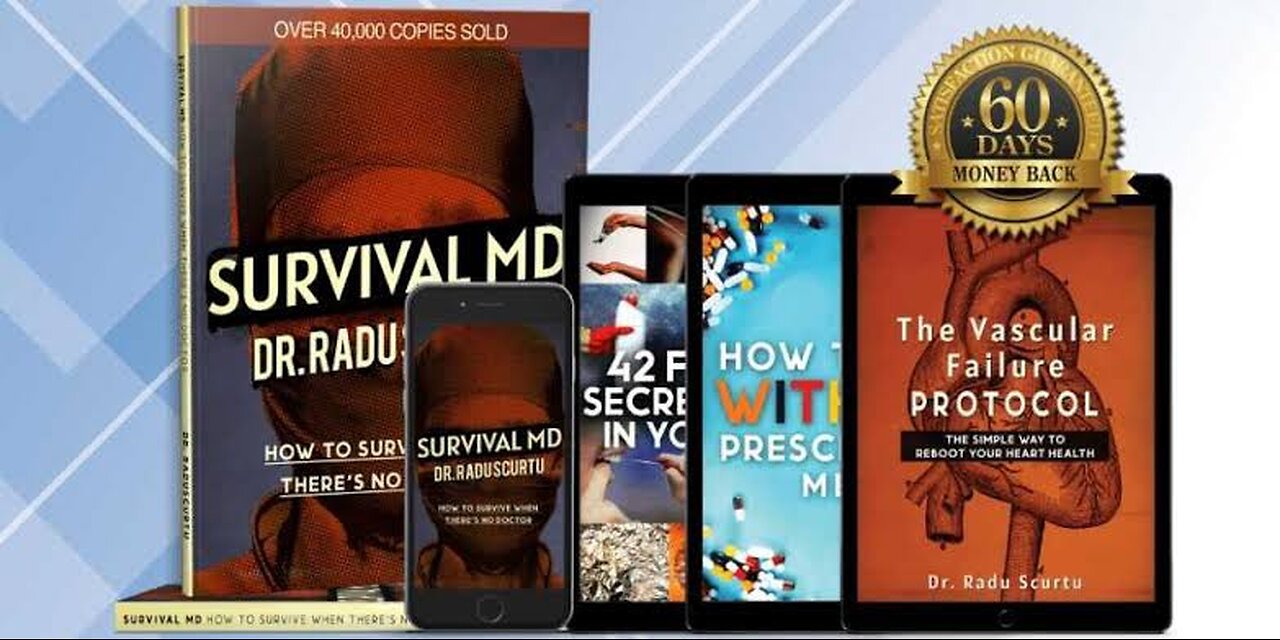Premium Only Content

SurvivalMD Book (printed)
https://n9.cl/3wr2e
At a media junket in Idaho last year, Buck Knives welcomed Jim Cobb, the author of Prepper's Long-Term Survival Guide, whom I met for the first time. He has been a prolific writer for numerous magazines throughout the years, so I was aware of him. He is the author of ten books and the editor-in-chief of the periodicals Prepper Survival Guide and Backwoods Survival Guide. The extended and updated 2nd Edition of Prepper's Long-Term Survival Guide will be released in 2023. The first edition was published in 2014. I am reviewing this book as someone who has never read the first installment of the franchise because I haven't read it myself.
I wouldn't consider myself a long-term prepper by any means, but this book has definitely helped me recognize the gaps in my preparation that go beyond a three-month window. I have stress-tested my preparations based on an ice storm that takes out the grid throughout several counties for a few months, having gone through multiple five-day power outages. My family, my dogs, and I should be able to survive for that long with some degree of comfort, I think.
But what if there was a real Excrement Meeting/End of the World As We Know It scenario? Where my preparation stops, The Prepper's Long-Term Survival Guide takes us.
Every chapter begins with a fictitious journal entry written from the perspective of an EMP explosion survivor, detailing various aspects of the protagonist's family and local community.
These entries establish the tone for the chapter by providing instances of achievements, regrets, wishes, etc. in the relevant topic matter. Although it would be all too simple for a book such as this to read like stereotypical instructions, these sections do an excellent job of bringing the subject matter to life. I discovered that I could relate to and even support the fictitious diary writer.
Each chapter's remaining sections are divided into significant subsections, and there are numerous lists and sidebars to logically break up the content. The former cover everything, including first aid supplies and lists of garden items.
whereas the latter frequently offer particular examples or advice on a chapter topic.
"The mark of another man's genius is how much you agree with him," wrote novelist WEB Griffin. I feel that my knowledge base on some issues is more than average when compared to other topics, which helps me assess Jim's recommendations more accurately. Because of my experience as an EMT and having managed the medical needs for a multi-month archeological excavation in a remote part of Kenya, the medical chapter serves as an illustration of this.
For groups of individuals operating in an off-grid setting for an extended period of time, his lists of medications and supplies, likely scenarios and dangers, and instructions for treating common diseases and accidents are appropriate and align with my experience.
I have a large garden as well. I make about 70 quarts of salsa every season, along with apples, pickles, beans, and strawberry jam. I can personally attest to a few of the advice in the book, as well as some that I learned from it, like the DIY seed tape shown in the above "Sidebar" picture.
Some things that I never gave much thought to, but probably should have, are the value of amusement and activities that raise spirits, the necessity of having a set of tools for cleaning chimneys, or the potentially uncomfortable duty of having to dispose of a body in a hygienic manner in the event that funerary services are unavailable.
A further chapter, Chapter 11: Community Survival Planning, deserves special attention. An excessive amount of prep and survival books and blogs promote a "Me vs. the World" mindset. That's not to argue that the significance of trust gradations between in-group and out-group layers of individuals isn't emphasized and described in detail. It most certainly is, particularly in this chapter as well as the defense-focused Chapter 7. It does, however, emphasize how crucial it is to collaborate with people in your local community to combine resources, particularly those that will help you all. Having extra hands makes security, food production, and labor-intensive manual tasks easier. Neighbors may possess unique abilities, such training in medicine or the military, or a practical trade.
In conclusion, I can't say that the book was "enjoyable" because it made me realize how unprepared I was, but it did it in a way that is realistic and approachable. It's not fun to think about the unfathomable, but Jim Cobb has already done a lot of the planning. With His Prepper's Long-Term Survival Guide Cobb, a lot of the "Gung-ho Survival-Bro" bullshit is stripped away, leaving a sensible road map for both new and experienced readers to follow in order to achieve long-term self sufficiency in the worst-case scenarios.
Recognition: I express my gratitude to Jim for granting me a review copy of the book. Jim did not attempt to sway my review; it was given to me without charge.
-
 1:15:29
1:15:29
Flyover Conservatives
22 hours agoFrom Cool to Cringe: How Democrats Lost America’s Ear | FOC Show
23.5K3 -
 8:19
8:19
MattMorseTV
8 hours ago $2.90 earnedTrump is ACTUALLY DOING IT.
13.6K30 -
 LIVE
LIVE
ZWOGs
11 hours ago🔴LIVE IN 1440p! - Tarkov w/ Casey & crgoodw1n, Kingdom Come Deliverance, & More - Come Hang Out!
190 watching -
 LIVE
LIVE
We Like Shooting
15 hours agoWe Like Shooting 625 (Gun Podcast)
165 watching -
 1:45:02
1:45:02
Glenn Greenwald
6 hours agoIsrael Slaughters More Journalists, Hiding War Crimes; Trump's Unconstitutional Flag Burning Ban; Glenn Takes Your Questions | SYSTEM UPDATE #504
113K119 -
 1:29:31
1:29:31
Killerperk
2 hours ago $0.35 earnedRoad to BF6. Come hang out #regiment #bf6
19.8K1 -
 LIVE
LIVE
Jokeuhl Gaming and Chat
3 hours agoDARKTIDE - Warhammer 40k w/ Nubes Bloobs and AoA
39 watching -
 LIVE
LIVE
Cripiechuccles
4 hours ago😁💚💙MOTA MONDAY WITH CRIPIE💚💙 👌SMOKING, GAMING & WATCHING FLICKS!:😁
43 watching -
 36:11
36:11
Stephen Gardner
3 hours ago🔥'Burn ALL TRUMP FLAGS’ says Tim Walz + Democrat CAUGHT rigging own election!
20.1K12 -
 10:10
10:10
robbijan
1 day agoHollywood’s Hidden Messages: Predictive Programming & What’s Next
15.7K17